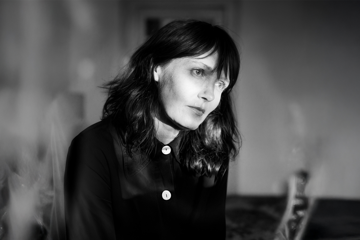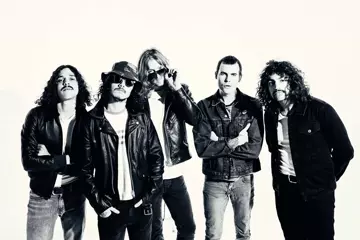 Sarah Blasko
Sarah BlaskoMost music documentaries almost by definition spend their time looking in the rear-view mirror, evaluating the legacy of an artist or band by presenting an overview of their career and using archival material and interviews to place it in a certain context after the fact.
New doco Blasko, on the other hand, places its protagonist Sarah Blasko firmly in the now, watching as she embarks on the process of concocting a new album from scratch with her band in an ornate theatre space. We still get plenty of history and live footage as well as an intimate experience with the lauded singer-songwriter - much of it is narrated in her own voice, and Blasko's childhood and family life is examined with genuine poignancy - but it's the sneak peek behind the curtain into her creative mindset that really illuminates.
The film follows Blasko and her tight-knit crew of musicians as they undertake a two-week residency at Campbelltown Arts Centre in Sydney's inner-west, the open invitation to participate allowing them to embark on an ambitious - but ultimately fruitful - creative voyage, as they create their own vibe in the beautiful space they'd been gifted access to.
"I got asked to do the residency over a year before I actually did it, and it was one of those things where I had no idea where I was going to be in a year and a half's time, so I thought, 'Well, the opportunity is there I should look into it'," Blasko recalls. "And they basically said that I could do whatever I want out there, I could collaborate with other artists or just do my own thing - there were no real constraints and I could just do what I wanted. So I booked it in as not really a leap of faith, but having no idea as to what it would actually be.
Don't miss a beat with our FREE daily newsletter
"I've known Brendan [Fletcher] who directed the film for more than ten years, and I'd been wanting to do something for years that crosses the boundary between a live show and film - a stage thing. I love the weirdness of theatre being filmed. I really enjoy going to see this thing they do in England where they film plays and then you can go and watch them in the cinema, or you can even go and see an opera at the cinema, and it creates a really weird vibe because you're watching something that's meant to be a live experience, but it's filmed so it puts you really oddly close to the people.
"So when I talked to Brendan originally and told him that I had this theatre space, I said, 'Oh, maybe I'll do this in collaboration with him where I do this theatre piece and he'll film it, and maybe I'll write a few songs to go in there as well.'
"But basically I didn't get my shit together and I hadn't written anything for basically a whole year - I was actually really struggling to write anything at all. I was going through one of those times you go through every so often where you're just not sure what you want to do next. But in the end I just thought, 'How can I use this live space for music and write in the spirit of the theatre, and use the theatre in some way?'
"And I knew that was really strange because other people just go out there to write in solitude, but it just seemed too tantalising with the lights and the sound and the organ and the beautiful atmosphere of the space. And because I'd been experiencing a bit of writer's block it was really important for me to just reconnect with anything to do with why I got into music in the first place, and that's all about playing music live and the thrill of that, so I sort of thought that maybe this approach was going to revive me and get me excited [about writing again]."

The first week of the project finds the team mining a rich artistic vein, clearly having a lot of fun as they experiment with random ideas and let the flowing creativity engulf them. "It's a pretty ridiculous process at times," Blasko laughs. "This is one of the most jovial songwriting projects I've experienced, because I don't always write with people all around me like that, and obviously when you're writing on your own the process is very different. But we wrote this way for the last record [2015's Eternal Return] and I really enjoyed how it played out: you almost have to act like a moron at times just to get the ideas flowing.
"I find it interesting because it didn't used to be the way I'd write with people at all - it used to be a much more intense and serious thing - but I do see the way that the playfulness and a looseness can really help in the creative process. You sort of shake yourself out of the doldrums and come up with something new."
Given that she'd been having creative difficulties leading into the residency, Blasko seems clearly pleased to end the drought as the ideas start piecing together. "It's an amazing feeling," she admits. "It's like you're meeting a new person and they're really exciting, and you never know quite what's going to happen. There's a freshness there, but then the difficulty comes in the refining of things - the beginning is the really fun time when you're not judging yourself so much, because you know you can have a million ideas and you don't have to commit to all of them.
"It's like dating or something, you're just trialling a few things: you might write a reggae song and you know that you don't really want to write a reggae album but it doesn't matter. I think it's really important to go down those paths to see what happens and somehow a colour or a flavour can appear. I like trying to create in a way that's really open, but then at the end of the day it's still you and your voice and your aesthetic choices so it's still you. That's the best thing about being a solo artist compared to being in a band, it's a little bit freer."
Having said that, Blasko's obvious rapport with her bandmates - Ben Fletcher, David Hunt and Nick Wales in particular - meant that even though they're ostensibly working on a solo project the process is extremely collaborative in parts, especially during this early phase. "It is, definitely," Blasko concurs. "I just feel like I often direct where I have a vision for where I want something to go - I just know what I like and that just sort of comes through in the process anyway. So that part at the beginning is just about having everybody as equals and if you don't approach it like that then you don't get the most out of it. That's the point of writing with other people - you're not writing on your own and you're trying to put all of your strengths together.
"Plus I've played with these guys for so long and know them like brothers, so it made sense to try writing like that. For me it's like if you're going to go there with somebody, it makes sense to go there with people that you know really well and can really have fun with."

Since the late-2016 residency, Blasko has completed work on her forthcoming sixth album and she attests that it's comprised largely from the ideas we see formulate throughout Blasko. "There's only really one song that I'd written beforehand that's on the album and then all the rest stem from this period," the singer smiles. "There were a lot more ideas - there were about 30 ideas - but everything was really skeletal… like, the lyrics were all just mumbo jumbo, but basically the album all traces back to that time. I basically wrote the whole thing - or the start of the whole thing - there."
At one point during Blasko, when the singer is trying to articulate her love of performing in the live sphere, she ponders aloud, "Maybe the essence of what I do only exists on stage". Has it been frustrating then over the years attempting to capture that elusive live spark in the studio?
"Yeah, I think it has been frustrating at times," she reflects. "I've long thought about the struggle to capture the live energy on tape and how I've never really managed to distil what I'm like live. And then I started to think, 'Is that even a negative thing? Is that bad?' It seems negative or frustrating, but I think even more and more that the things that you can't contain or you can't bottle or you can't film - people are always trying to film shows and capture everything in this day and age - but I think more and more that I really value those things that are fleeting and [believe] that there's beauty in that.
"So in a sense I kind of love that you can't capture it - and how it's just this thing that I experience, and that the people that I play with experience and the people in the room experience - and that's valuable and that's special. I think as time goes by I'll probably continue to try to capture elements of those things that happen live [in the studio], or do a record that's more stripped back - that's definitely something that I'd really like to do over time and that I've always wanted to do. But I think it's cool that they're different entities as well: that's why people go and see live shows or go to the theatre or whatever, because it's a thing that's alive on that stage at that moment."

















